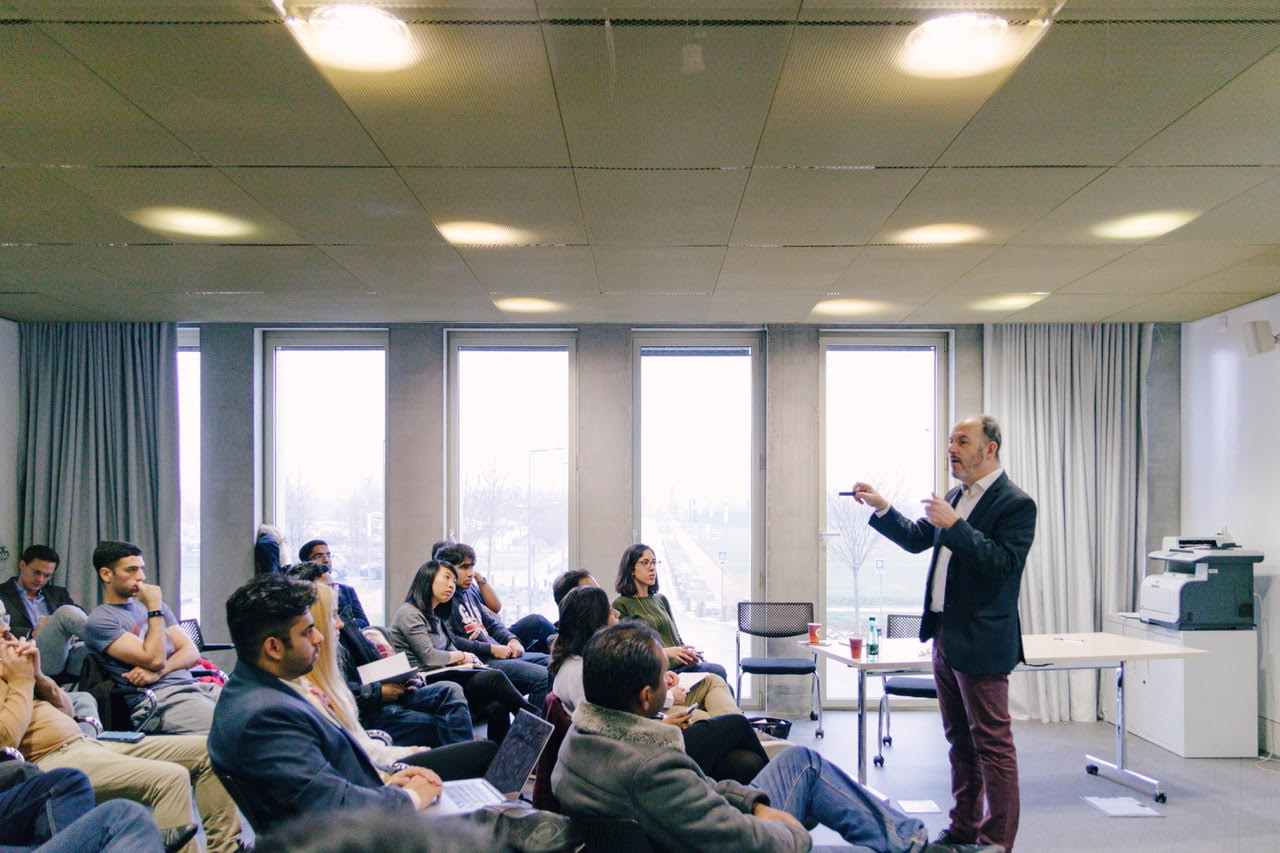Michel Safars: A Pillar of Entrepreneurship and Innovation at HEC Paris
The HEC Paris Innovation & Entrepreneurship Institute may have been recently established, but some people have been engaged in entrepreneurship at HEC Paris way before its inception. Michel Safars is one of these people. Closely involved in both entrepreneurship and deep tech within the school since 2002, he is considered as one of the pillars of the entrepreneurship and innovation ecosystem at HEC Paris. This month, during the commencement ceremony, he was even awarded the Pierre Vernimmen BNP Paribas Teaching Award 2024 for his exceptional engagement with students in the fields of entrepreneurship and deep tech. A 1995 alumnus, a serial entrepreneur and the Academic Director of the MBA Entrepreneurship Track for the last 20 years, we interviewed Michel Safars, HEC Paris Professor of Strategy and Business Policy, to gain his perspective on what teaching entrepreneurship is all about.

Jean-Luc Allavena, co-founder of the HEC Paris Entrepreneurship Lab and HEC Paris Professor Michel Safars. [The HEC Paris Entrepreneurship Lab (eLAB) was co-founded by Pascal Cagni (its initiator), Jean-Luc Allavena, and Pascal de Jenlis—all three are major donors to the Fondation HEC.]
What is your expertise, and what do you enjoy bringing to your teaching?
I have been an entrepreneur since the age of 24 and have coached numerous professionals and CEOs. While my specialty is entrepreneurship, my true passion lies in helping students to learn and grow by teaching what can't be easily found in books. This is why I also teach decision making and soft skills. The dynamics of people working together also deeply interest me because it is pretty easy to improve the way people interact. Self-awareness and understanding their motivations for wanting to be entrepreneurs are crucial too. So part of my teaching is also to make students understand that entrepreneurship is not only a question of hard skills.
How do you get them to answer these questions?
At the beginning of my class, I like to ask students, "Who wants to be an entrepreneur?" Most raise their hands, but I know many aren't there because of a true desire to be entrepreneurs. Then I ask, "Who wants to escape large corporations because they are tired of being just another cog in the machine?" About two-thirds raise their hands and admit, "You're right, we want to have our own life, change the world, and escape the confines of a large system that doesn't meet our expectations." Even if they are successful and make money, they want to do it on their own terms.
So, the real question about entrepreneurship is: "Do you truly want to be an entrepreneur because it resonates with you, or because other alternatives don't meet your expectations?" We delve into this topic, and some students soon realize that entrepreneurship might not be the right path for them. We also discuss whether they want to be an entrepreneur or a co-founder now or later, whether it's better to aim for a CEO role in a startup, or in a C-level position to reduce stress and responsibilities… for the first entrepreneurial experience. Or even work with startups rather than within one.
Ultimately, many students are uncertain about what they want after their MBA. It's a bit like their first midlife transition, and entrepreneurship becomes just a chapter in their broader life story.

You talked about ‘things that can’t be found in books’ earlier, are there books you systematically recommend to your students?
"The Startup Owner's Manual" and "The Four Steps to the Epiphany: Successful Strategies for Startups That Win" both by Steve Blank, are must-read books. Blank is a remarkable writer. While some aspects of these books may be a bit outdated, they still offer a valuable recap of key hard skills. Additionally, "Disciplined Entrepreneurship: 24 Steps to Success!" by Bill Aulet is also highly recommended.
Personally, I am passionate about techniques for developing soft skills. I frequently use the Process Communication Model to prevent human crises and prevent conflicts. Specifically in my teaching but also when I coach real entrepreneurs. After all, a significant part of entrepreneurship involves avoiding conflict and building a cohesive team.
Why is it so important to ensure people are aligned in a startup?
Everything that is intuitive is somehow easy because it seems “logical” to us. However, when faced with non-intuitive tasks or even more when counter-intuitive, challenges arise. Many people mistakenly believe that everyone is similar to them and will interact in familiar ways. This assumption can lead to misunderstandings or disagreements. Not to forget that about 95% of our MBA students are international, meaning their interaction styles and perceptions of entrepreneurship vary. What they learn here can be applied globally.
For example, when I was giving a class to MBA students at Torcuato Di Tella University in Buenos Aires, a student remarked that they almost didn’t have venture capitalists (VCs) in Argentina. I asked how they approached entrepreneurship. He replied, "We simply don’t practice entrepreneurship that way; our ambition is to have a small but very efficient company, get autonomy and still have success."

Have you noticed major changes over time in terms of student expectations or behaviors?
Of course, the world has changed dramatically! Students' ambitions vary: when the market offers fewer opportunities to raise funds, they tend to shift more towards consulting or finance, and vice versa. Regarding startup creation, a very interesting and growing trend is Entrepreneurship Through Acquisition (ETA). One of its variants is Search Funds. This form of entrepreneurship is particularly popular among MBA and Executive MBA students, as it aligns well with their profiles and offers strong mentoring. Consequently, I am establishing a practice at HEC Paris to support the many interested students and their dedicated club within the school.
In terms of sectors, social entrepreneurship, impact entrepreneurship, and ethics have gained significant importance. However, the desire for quick success remains strong.
What’s particularly interesting about the MBA Entrepreneurship track is that many students enroll not to create a company immediately, but to first gain a comprehensive understanding of entrepreneurship. As I mentioned earlier, some will eventually become entrepreneurs, but the majority do not pursue this path right away. Instead, they often work in large international companies, venture capital firms, or consulting groups, engaging with entrepreneurship from different perspectives. Personally, I encourage them to aim for C-level positions, but not necessarily to take on the CEO role immediately. This way, they learn by doing, mitigate their personal risks, and calm their sense of urgency to become "rich and famous," allowing them to adjust their goals, motivations, and develop their capacities.
You played a pivotal role in connecting HEC Paris with the Paris Saclay cluster. Can you explain how and why you facilitated this collaboration?
For over 20 years, the Paris-Saclay cluster has hosted an incubator called IncubAlliance. I have been involved since its inception and now serve on its board, representing HEC Paris. This incubator is dedicated to Deep Tech within the Paris-Saclay hub, which includes numerous schools, public research institutions, and a dense network of companies and actors. Part of my expertise lies in understanding how Deep Tech operates and connecting these labs with the entrepreneurship ecosystem. Consequently, I often have students from the MBA Entrepreneurship track work on Deep Tech projects.
This connection between HEC Paris and Paris Saclay University as well as Institut Polytechnique de Paris is going strong, as evidenced by the annual Paris Saclay SPRING event.
To find out more about Michel Safars, visit his biography.
The HEC Paris MBA Entrepreneurship Specialization is tailored for those eager to master the art of business creation and growth. Explore the dynamic world of entrepreneurship and set the stage for your entrepreneurial success.